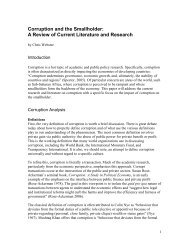13th Annual International Management Conference Proceeding
13th Annual International Management Conference Proceeding
13th Annual International Management Conference Proceeding
You also want an ePaper? Increase the reach of your titles
YUMPU automatically turns print PDFs into web optimized ePapers that Google loves.
V. RECOMMENDATIONS : ADDRESSING THE CHALLENGES<br />
These challenges are risks have spread owing to the lack of political commitment and crisis of legitimacy largely due to<br />
the concentration of political and economic power as well as the wealth of the nation in hands of a few well endowed<br />
individuals. SMEs have not been able to grow out of the tiny family outfits that they are. This is because mistrust<br />
between members of the populace has made people unwilling to pool their resources together to build viable<br />
enterprises. This has constrained growth and expansion.<br />
To address these challenges and risks, there is an urgent need to focus on public policy and uphold the virtues of a<br />
pluralistic society. The government must play its role of putting in place an effective policy framework and the social<br />
capacity needed for the growth of corporate governance. However, creating an enabling is not the prerogative of the<br />
government alone. Rather it calls for the establishment of effective partnerships between the public sector, private<br />
sector and civil society that will enhance the spirit of participatory development and increase citizen engagement in<br />
creating secure and stable environment in which corporations can grow and thrive.<br />
From the above discussion three implications can be derived. First, a Corporate Governance Code for SMEs in Kenya<br />
must be created. These standards could be established with the help of an expert group with members of all relevant<br />
institutions of the field and should be based on three main principles, namely:(i)a strong orientation towards the<br />
particular needs of SMEs (Timmermann 2003), (ii) a flexible framework that can be adapted to the heterogeneous<br />
field of SMEs (Timmermann 2003), as well as (iii) a clear and easily understandable content by which it can be<br />
adapted to the daily problems of SMEs. This corporate governance code for SMEs should include four important<br />
components (Strenger 2002, 2003), namely principles for:(i) the transparency of management (i.e. strategies,<br />
structures, and processes),(ii) a supervisory or advisory board with external members,(iii) a planning and risk<br />
management system (e.g. cost accounting, financial planning, internal reporting), and (iv) a human resource<br />
management including a top-management succession planning (Hennerkes 2003, Loistl 2003).<br />
And secondly, since there is a consensus among the majority of SMEs researchers that Corporate Governance Code<br />
could be adapted to SMEs, the academic discussion of corporate governance should widen its focus. To include<br />
corporate culture in the SMEs in Kenya. The narrow focus of most academics has fostered the aversion of SMEs to<br />
the corporate governance topic in the past. Now a clear step ahead is needed which especially includes corporate<br />
culture as well as other dimensions of enterprises, alternative approaches beyond the classic principal-agents perspective<br />
and a more differentiated spectrum of actors (Steger 2004b). This way, academic experts of corporate governance will<br />
lead the way to considerable improvements for SMEs in the future, through widespread use of corporate governance<br />
practice.<br />
Gatamah (2002) stresses that, although there may be differing views on what constitutes corporate governance, some<br />
of which are culturally determined, there is need to develop a core of principles that transcend borders and which are<br />
viewed as representing the moral consensus of the international community of nations. SMEs in Kenya need to see<br />
corporate governance as vital to social and economic development of the country. This means that they must meet<br />
global standards of good corporate governance practices if they are to exploit the opportunities in the liberalised global<br />
market, be and remain competitive and achieve sustainable growth.<br />
Last but note least, it is important to set a benchmark for high corporate governance standards. This together with<br />
proper corporate culture would help to foster team work, enhance staff morale, motivate resources, minimize staff<br />
wastage and could have positive effect on a corporation's long-term economic performance.<br />
VI. CONCLUSION<br />
The importance of corporate governance in SMEs cannot be more emphasized as it forms the organizational climate<br />
for the internal activities of a company that will intern increase its output to the national economic development goal.<br />
If corporate governance is confined to broad governance, and beyond the board level and one that does not counterdemand<br />
innovation, research and development and corporate entrepreneurship strategies, it would have limited<br />
operational impact on SMEs. Since corporate governance brings new strategic outlook through external independent<br />
directors, it would enhance firm’s corporate entrepreneurship and competitiveness, which is much desired and which<br />
will lead to higher contribution of SMEs in Kenya’s economic development. It is not a threat to value creation in<br />
entrepreneurial firms should the guidelines on corporate governance be applicable.<br />
38
















